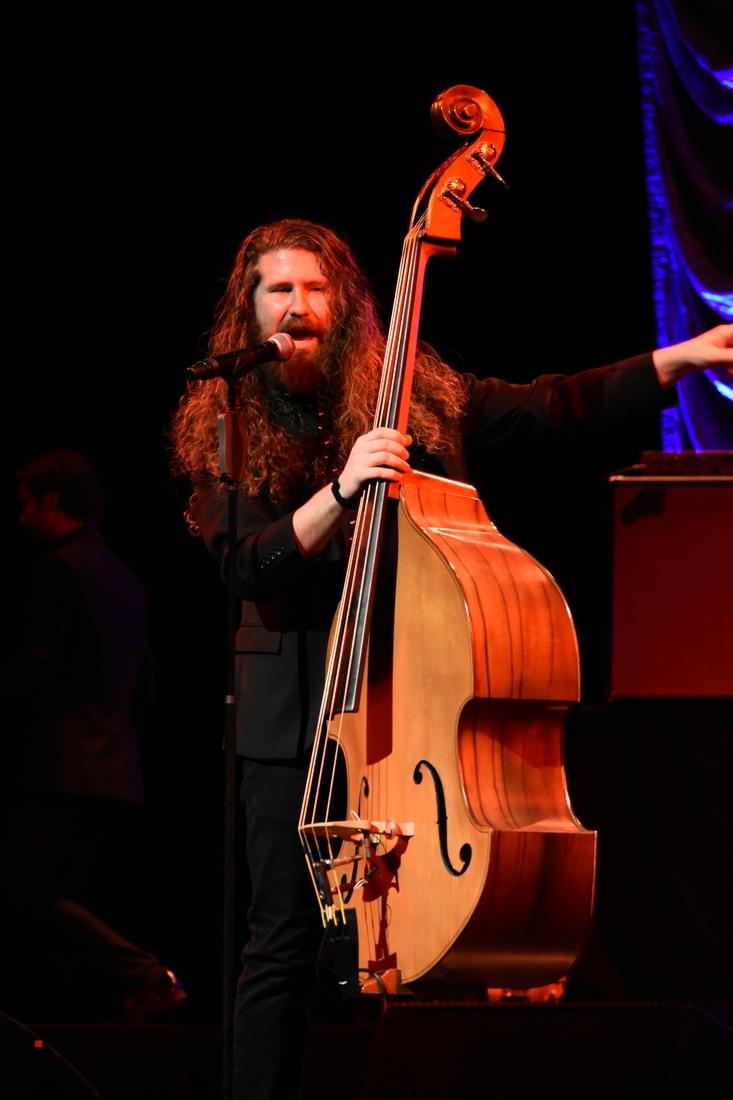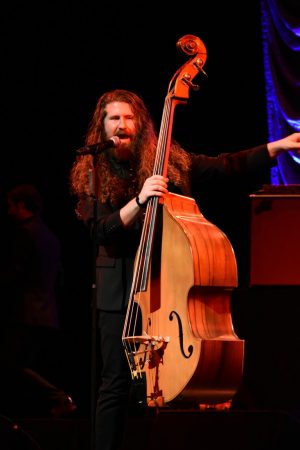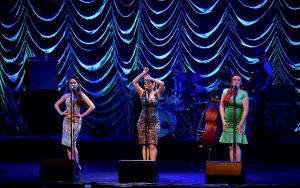PMJ works wonder at GBPAC
Jan 30, 2017
Regardless of your personal religious beliefs (or lack thereof), it is an undeniable fact that a miracle occurred this past Thursday, Jan. 26, when Postmodern Jukebox took the stage at the Gallagher Bluedorn Performing Arts Center (GBPAC). And that is because anyone who is able to make the song stylings of Miley Cyrus not only palatable but fully enjoyable deserves to be labeled a miracle worker.
Postmodern Jukebox, which was officially founded by arranger and pianist Scott Bradlee in 2011, is a musical collective of rotating members that specializes in performing modern pop songs with an old school twist – typically by infusing each song with a vintage sound inspired by such genres as jazz and swing. The group has acquired a substantial online presence by frequently uploading new re-workings of popular songs on YouTube.
And as it turns out, their stage presence is just as impressive as their online presence.
Indeed, there was a palpable buzz in the air as the members of Postmodern Jukebox took the stage on Thursday night shortly after 7 p.m. with the iconic opening notes of Europe’s “Final Countdown” reverberating throughout the GBPAC’s Great Hall with a jazz-inspired sound.
Bathed in blue light, the stage was adorned with only a giant curtain and the band’s various instruments. Little else was needed for what would be nearly two hours of some of the most original, rousing and technically sound musical compositions one is likely to find at any live performance.
Among the numerous highlights of the night was singer Robyn Adele Anderson’s stirring take on Carly Rae Jepsen’s hit song “Call Me Maybe,” which was transformed into a ragtime melody accentuated with piano and banjo and punctuated by an otherworldly tap dance routine by dancer Anissa Lee.
*NSYNC’s hit song “Bye Bye Bye” underwent an altogether different – but equally extraordinary – transformation as Anderson and fellow singers Dani Armstrong and Brielle Von Hugel transported the song back into the 1960s with a surf rock vibe aided by backing guitar riffs.
One of the most memorable performances of the night was a jazz-infused reimagining of Guns N’ Roses’ hard rock classic “Sweet Child o’ Mine,” performed by singer Casey Abrams – a long-haired Jesus look-alike whose voice was just as godly as his appearance. Capitalizing on the jazz-heavy instruments backing him – namely, trombone and clarinet – Abrams led the audience in an impromptu scat sing-along before tearing his jacket off as Lee returned to the stage for a tap dance routine that would make Fred Astaire rethink his career plans.
Suffice it to say that there were just too many other memorable moments in the show to count. Whether it was Armstrong’s sultry recital of Britney Spears’ “Toxic,” Von Hugel’s 1960s Motown reworking of Bruno Mars’ “Grenade” or Abram’s banjo-led bluegrass interpretation of Fountain of Wayne’s “Stacy’s Mom,” Postmodern Jukebox succeeded in delivering hit after (rearranged) hit.
Even the mash-ups that would have seemed questionable on paper were executed so well that their sheer audacity made the performances that much more powerful. Take, for example, Mario Jose’s rendition of Celine Dion’s “My Heart Will Go On” of “Titanic” fame, which was reworked into a 1950s doo-wop song in the same vein of legendary singer Jackie Wilson. Powered by Jose’s outrageous vocal range, the familiar lyrics of Dion’s song and the daringly vintage musical backing coalesced into a wholly unique musical composition that was unlike any other.
Throughout the night, Jose also served as the show’s emcee by introducing each song and incorporating some humor in his hosting duties. The natural rapport built up by Jose and his fellow band members with the audience in the GBPAC’s Great Hall that night ultimately culminated in a thunderous standing ovation at the close of the show.
Fortunately, Postmodern Jukebox must have been feeling generous Thursday night, as Jose returned to the stage for an encore performance of Radiohead’s “Creep,” executed as an impassioned soul-infused ballad. During this last song, the stage was flooded in purple and gold lights – presumably to reflect UNI’s school colors.
Postmodern Jukebox’s show Thursday night was a welcome change – both musically and artistically. Not only did the group push the boundaries of musical composition through a seamless blending of vintage and retro sounds with modern pop music sensibilities, but they also delivered a truly unforgettable live music experience.












